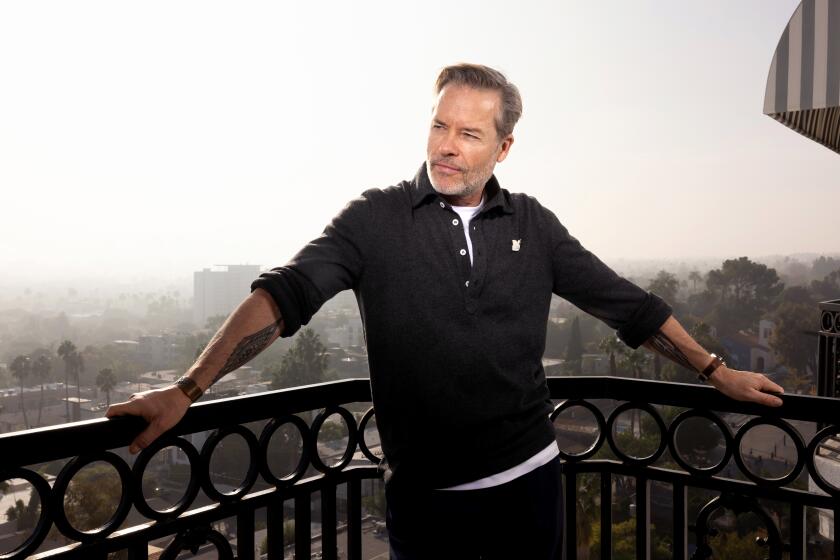Review: Jesse Eisenberg brings Marcel Marceau’s World War II heroics to life in ‘Resistance’
- Share via
Marcel Marceau, who died in 2007 at age 84, may best be known as a mime. But he was also a heroic Holocaust survivor who, as a young man, helped save hundreds of Jewish children orphaned by the Nazis.
This remarkable period of Marceau’s life gets the bio-drama treatment in writer-director Jonathan Jakubowicz’s “Resistance,” a tense and gripping thriller inspired by this World War II-era tale of courage and resolve against one of history’s most unthinkable evils.
Jakubowicz (2005’s “Secuestro Express”), who says he lost 400 relatives in the Holocaust, had four relatives on Schindler’s List, and experienced anti-Semitism in his native Venezuela (as a result of the latter, he moved to the U.S. in 2006), has crafted a handsome, compassionate, propulsive piece that clearly reflects his deep personal connection to the material.
The film opens in 1938 Munich, Germany, with a gut-punch sequence in which a young Orthodox Jewish girl, Elsbeth (Bella Ramsey), witnesses the death of her parents (Edgar Ramírez, Klára Issová) at the hands of Nazi officers. It unnervingly sets the table for things to come, including Elsbeth’s later return to the story.
We’re then introduced to Marcel Mangel (Jesse Eisenberg), a jaunty Jewish actor and painter living with his family two miles from the German border in Strasbourg, France. Marcel (who would later protectively change his surname to Marceau) works days for his butcher father, Charles (Karl Markovics), while at night he performs a Charlie Chaplin routine in a local cabaret of dubious repute. The traditional Charles, like Marcel’s mother (Louise Morell) and more devout older brother, Alain (Félix Moati), think Marcel is a selfish and irresponsible clown; Marcel says he must make art, that his body gives him no choice.
Marcel gets his chance to use his creativity for more noble purposes when his activist cousin, Georges (Géza Röhrig), requests his help with a band of Jewish orphans (including Elsbeth) who were diverted from Nazi capture and ensconced in a nearby castle under the care of a group of Jewish Scouts. Marcel is soon entertaining the kids with his pantomime skills, proving to his family that he’s not all about himself, and impressing attractive neighbor and Scouts member Emma (Clémence Poésy). His lesson to the children about hiding out in trees will have a nerve-racking payoff down the road.
But in the fall of 1939, after Germany invades Poland and is headed for France (the Nazis would occupy the nation’s northern half), Marcel, his family and compatriots escape with the orphans to Limoges in southern France, or the “Free Zone.” How exactly they made this more than 450-mile journey (we see them leave Strasbourg on foot) or any hardships they may have encountered en route go unseen.
By late 1942, Marcel, Alain, Emma and her sister, Mila (Vica Kerekes), join the French Resistance and travel to Lyon, where, upon arrival, Marcel engages in a terrific scene of derring-do and establishes his cred as a fighter. He also proves an expert passport forger, which will come in quite handy.
The key personification of the Nazis here — aside from Adolf Hitler, seen speechifying in archival footage — comes in the form of sadistic Gestapo chief Klaus Barbie (Matthias Schweighöfer), a.k.a the “Butcher of Lyon,” who meted out torture and murder from his base at the city’s grand Hôtel Terminus. (Was there ever a more ominous name for a hotel?)
According to Jakubowicz, there is no evidence that Barbie and Marceau ever truly interacted, even though the madman was a Lyon fixture at the time and was involved in rounding up children, among other heinous acts. But Barbie’s fictionalized historical presence here, emblazoned by a series of super-tense, often horrific moments (and further amplified by Schweighöfer’s disturbingly wicked turn), gives the film an extra-vivid jolt.
Ultimately, Marceau and his fellow resisters must smuggle the orphans out of Lyon and across the Swiss border against all odds. This provides the film, which was deftly shot in the Czech Republic, with one final harrowing scene of escape, daring and ingenuity — all as the Nazis attempt to hunt down our heroes.
There’s also a rather grand-scale, if not wholly needed framing device set in 1945 on a former Nazi rallying grounds in Nuremberg, Germany. In it, Gen. George S. Patton (Ed Harris) introduces 3,000 of his troops to Marceau, who goes on to perform his chalk-faced pantomime for them in his first official public show. (Marceau had actually served as a liaison officer for Patton.)
Although Marceau is the linchpin for the narrative, he and his mime artistry don’t overwhelm the story and sometimes even take a backseat to the film’s many characters and events. If Eisenberg is an unlikely choice for the role given that the actor, who bears a passing resemblance to the young Marceau, is roughly twice as old as his character was at that time, he keeps his familiar acting tics in check while nimbly embodying the famed performer with sparks of talent as well as credible urgency, sympathy and grace.
'Resistance'
In English and German with English subtitles
Rated: R, for some violence
Running time: 2 hours, 2 minutes
Playing: Available March 27 on VOD
More to Read
Only good movies
Get the Indie Focus newsletter, Mark Olsen's weekly guide to the world of cinema.
You may occasionally receive promotional content from the Los Angeles Times.










